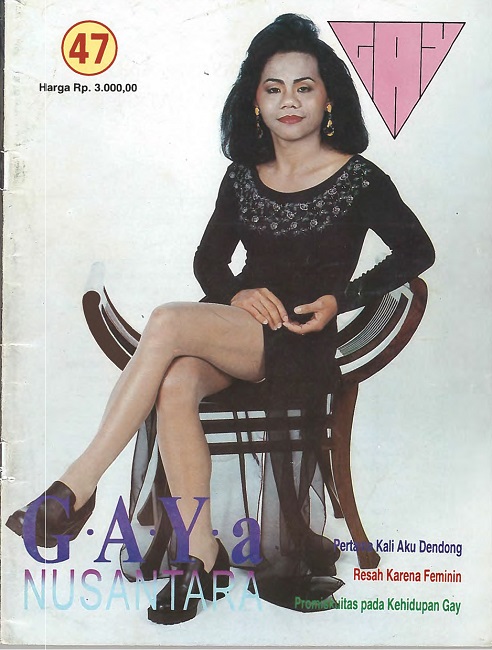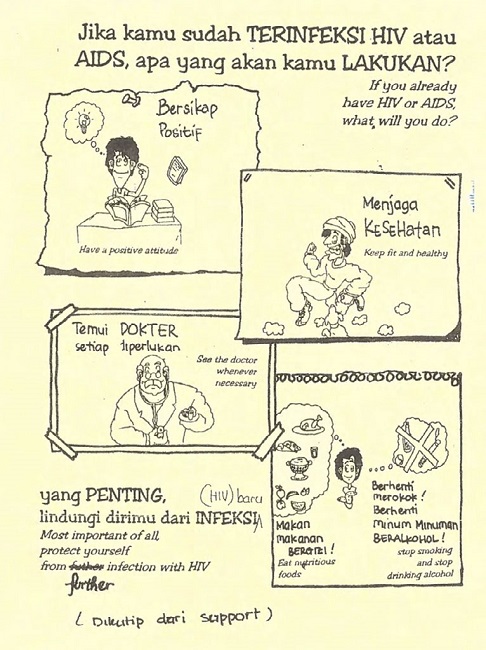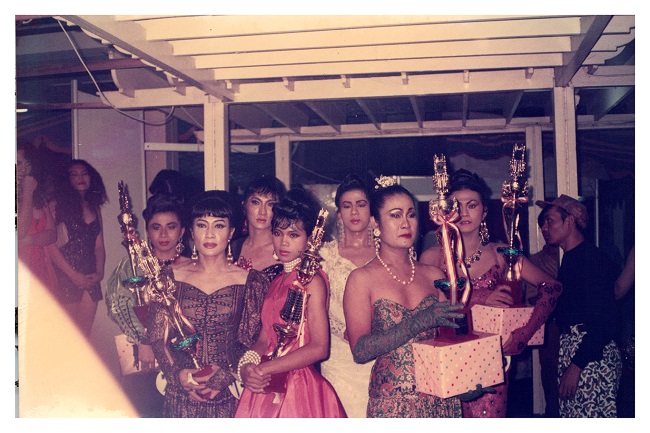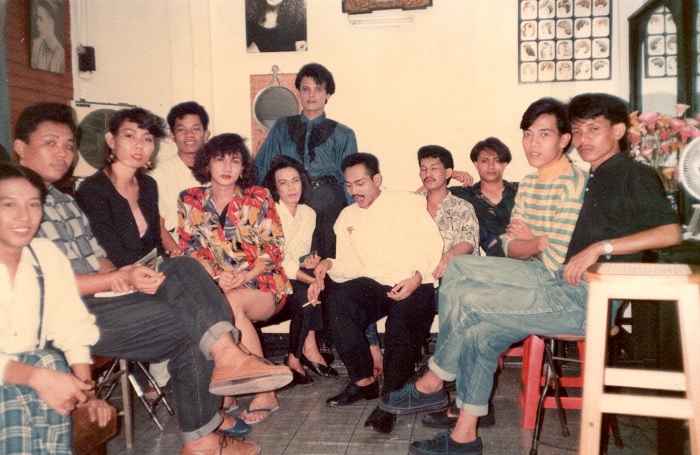The Queer Indonesia Archive (QIA) is working to preserve and safeguard the histories of Indonesia’s queer community
Sidhi Vhisatya
Versi Bh Indonesia
In December 2022, two pieces of news related to queer issues circulated on Indonesian social media. One was the passing into law of the Criminal Code (Kitab Undang-Undang Hukum Pidana; KUHP), which raised anxiety about the potential criminalisation of the queer community through future legal codes. The other concerned an anti-LGBT statement made by the mayor of Medan, which created a looming fear of persecution via regional regulations. In addition, some cities in Indonesia, including Makassar and Garut, have recently proposed ‘anti-LGBT’ regulations.
As these events unfolded, members of the queer community maintained constant contact with one another, and some actively criticised these developments through advocacy and awareness-raising on social media. Some have stayed calm and hoped that the reporting eases up soon. Media interest in LGBT issues, especially during an election year, creates anxiety for individuals, collectives, and organisations in Indonesia. The reproduction of narratives and regulations against the LGBT community by politicians and the government has added to the stigma and discrimination experienced by the queer community, forcing them to develop new strategies or redevelop existing ones for their individual and collective safety.
During the process of documenting archives from 2021 to 2022 - digitising personal collections, community publication and ephemeras as well as recording oral histories, the Queer Indonesia Archive (QIA) found many accounts of people feeling increasingly fearful as an election year approaches as well as accounts of their past traumatic experiences. Some recounted the horrific persecution they experienced during the post-New Order era, while sighing heavily. Others spoke quickly and with a sense of urgency. They explained that they now have to be careful if they want to organise events, unlike in relatively less fraught times when coercion was not as widely used by vigilante organisations, gangs, mercenaries, political thugs and private security forces. Their accounts were also full of joy and happiness about how they found each other, united and navigated life together.
Documenting queer history
As a project that archives queer history, QIA dedicates its work to documenting, sustaining, and celebrating depictions of the queer community's lived experiences in Indonesia. This process includes addressing fears and anxieties that intersect with traumatic experiences. The project is also acutely aware of the need to protect the safety of and personal data about the subjects held in the archive and the materials and stories they donate. These concerns lead us to regularly evaluate our efforts to create a safe space for those whose material is kept in the archive.

In this short essay, we do not offer a formal concept of a safe space, which is something we have repeatedly questioned whether or not can be feasibly created. Instead, we map our archiving process at QIA and explore whether there are any safe spaces which have emerged during the archiving process itself.
Building an archive
QIA was initiated in early 2020. Our first notable archiving work included the repatriation of scanned community publications collected by Tom Boellstorff during his research in Indonesia. In this early work, we adopted a community archiving model, which offers a grassroots alternative to mainstream collections. In this way, the community can work collectively to highlight their own values, producing a form of ‘collective memory’.
We used this approach to respond to the lack of historical records and public accounts of the lived experiences of queer people in Indonesia. References to their lives are dominated by mainstream narratives that are often limited by media representation, including considerations of what is worth reading. The media also draws on explicitly cisgender and heterosexual forms of language that eventually erase the perspectives of queer people. These limited historical records are overall hidden within keywords that do not fully represent queer lives.
Without discrediting the work of mainstream and institutional archivists (we collect their materials as well for additional context), their limitations cause many queer lived experiences to be reduced, undocumented, inaccessible, or even lost. Community archiving became our foundation for gradually collecting those missing stories, and then sustaining and celebrating them. However, how do we, as an archiving community, collect, sustain, and celebrate those materials about the queer community in Indonesia without excluding them in the process of archiving?
QIA uses the term ‘queer’ to show our interest in materials from people with diverse sexualities, gender identities and expressions which are considered non-normative. We do not want to reduce gender and sexuality diversity in Indonesia by using borrowed terms from the English language. We are open to the possibility of more diverse genders and sexualities in Indonesia, alongside their practices.

In our first year, we created a database for names, organisations, zines, and events from scanned community publications and photo albums in our earliest collections. We used this database as a reference to decide who to contact and to contextualise their involvement. Through our conversations with activists who were active between the 1970s and1990s, we gathered more information and additional contacts.
These names, years, places, and stories were compiled and arranged into a graphic timeline. These trajectories eventually became our first exhibition held in early 2021 titled Echoes from The Past, which was also was launched with an online public event.
Creating safe space within the archive
In preparing for this first exhibition, we met many who maintained their own personal collections of publications and related ephemera. We had to explain to them the importance of community archiving and why it is crucial to document materials, including personal photos and letters. These materials contain memories of places, people, events, and networks of knowledge which belong to the queer community. The concept of archiving is new for many members of the community, and reading materials inside those photos and letters is also unfamiliar, including for us in our early days. Our exhibition, which narrated archive material, was an effort to bridge this gap while introducing QIA and our archiving work. The exhibition was also an attempt to present a simple framework for understanding the history of the Indonesian queer community.
We also met some queer people who were uncomfortable with their materials being made public. Some of the materials contained information about individuals who are not open about their gender/sexuality identities or decided to marry heterosexually, which meant that information about them in the archive cannot be published without their consent. Some subjects were worried that donating materials to a community archive would mean giving up ownership and usage rights to the archive.
To address this problem, we drew on the concept of ‘open’ (terbuka) and ‘closed’ (tertutup), commonly used by queer people in Indonesia to modify their speech and dress to reveal their identity depending on the context. Borrowing this concept and applying it to queer archives, transfer of ownership and usage rights does not mean losing control over access to materials, including the way that researchers draw on and interpret knowledge stored within it.
The ability to adjust the access and usage status of material ensures there is flexibility in taking the necessary steps to protect their material (and security) if a threat were to emerge.
This concept became the basis for adopting three access options for donated materials: public, private, and restricted. If private materials can only be accessed by the public with the approval of QIA, access to restricted materials can only be granted by the owner (donor) of the materials. We also adopted use of a participatory informed consent form to be completed by donors, which asks open-ended questions about permission to use, specific conditions for accessing the material, naming options and others. Authority over those materials is also shared by allowing subjects to modify agreements if they feel it is necessary.
Preserving marginal histories
Archiving work, especially related to communities, often intersects with certain vulnerabilities. In the case of queer communities in Indonesia, physical materials are often not passed down between generations for various reasons: swept away by floods, damaged, frequent changes of residence, deliberately removed for safety, changes in life trajectories and others. These reasons are often related to limited life choices that force queer individuals to live in poverty. This means that the physical materials that are preserved often only represent certain groups: people who have the space and living conditions to store personal collections.

Since learning about the practice of oral history at the end of 2021, we have used this approach to bridge the gap. Through a series of interviews, oral history allows us to engage the memories of subjects not represented in physical materials (photos, letters, posters and others). It helps us to understand their language, delve into the dynamics of their lives and provide a space for queer individuals to narrate their own community history. We have also invited several collaborators who understand the community, issues, or specific areas to participate in this process as interviewers. As with the physical archive, we seek consent from our subjects to include the interviews in our archive. If they give their consent these will be published, or alternatively they may choose to have their contributions stored in our archive as either 'private' or 'restricted' materials.
We started this oral history process with some preliminary research on the subjects whom we selected based on our existing contacts and outreach. In 2022, we focused on six main cities (Yogyakarta, Solo, Makassar, Malang, Bali, Surabaya), where organisations and individuals who were actively engaged in the Lesbian and Gay networks in the 1990s, are based. This pre-interview research process is important to design a guide that provides space for the subject to talk about memories that are important to them. Instead of making it a confirmation process about the facts contained in the collection, we allowed subjects to direct the conversation.
On several occasions, the interview process becomes a space for subjects to share their past traumas. They use this opportunity to become vulnerable and open up. Some of them turn it into a gossip session, discussing their anxieties and conflicts within the community. At other times, some subjects may say things that contradict the values held by the interviewer. Just like the subjects, the interviewer also has certain biases and prejudices. Interviews present various unexpected situations that we may not anticipate. With initial research and introduction processes, we try to build trust and understanding so that these things can be discussed with empathy, focusing on the subject's life story rather than passing judgment.
We end the interview process with a team reflection. Besides evaluating the interview process, we express gratitude, joy, disagreement, anxiety and any other feelings that surfaced. Mapping emotions and communicating them within our team is one of our efforts to navigate the emotional consequences that arise from interviews.
I have only scratched the surface of various avenues for archiving work, and there are gaps which must be addressed. We understand that a safe space cannot be created solely by formal written guidelines or policies and neither can its needs be standardised.
Sidhi Vhisatya (sidhivhisatya@gmail.com) is a volunteer curator and program manager in Queer Indonesia Archive.












